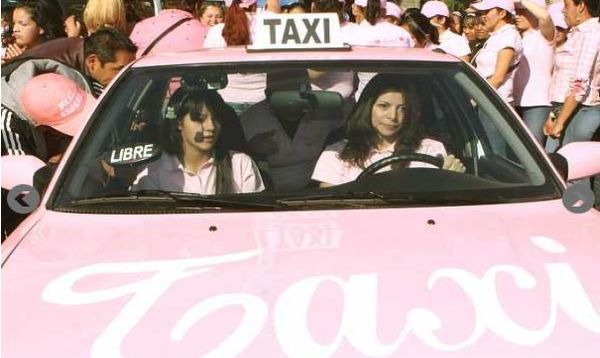Mexico City, Mexico ó Every few years, Mexico Cityís taxi owners are required to repaint their cars a designated color.
But pink?
The uniform standard has helped to control and monitor cabs, going a long way in making a once-notorious business more professional, reliable and safe. The number of kidnappings by taxi drivers has declined significantly.
Taxi drivers grumble at the expense, convinced that the cousin of someone in City Hall owns a car-painting business and is benefiting from the latest repigmentation program. Others view it as an ego trip for the latest mayor, Miguel Angel Mancera, who took office in 2012 and wants to put his stamp on the cityís transportation system.
But this yearís selection of Pepto-Bismol pink as the official color has led to more than the usual protestations, and not just by the cabbies but also by anyone with any sense of urban aesthetics.
"Any color but pink," said Edgar Diaz, who has been driving cabs for 17 years. This will be the third time heís had to paint what is currently his white vehicle with red trim. "Yellow, red, maroon. Iíd even take pistachio green."
"Itís not right," cabby Sergio Olicon said. "Each government wants to impose its own color. It should be one color all your life."
Rufino Leon Tovar, the cityís secretary of "mobility" (a position that used to be known as transportation secretary,) said the color was chosen by a focus group shown a variety of colors. They settled on pink, he said, what he called rosa mexicana. Hard to imagine.
Repainting the cars is part of a broader plan to "regularize" the taxi system and other public transportation, Leon said. According to the plan: By mid-2018, all 140,000 taxis in Mexico City will be painted rosa mexicana.
In the minds of many taxi operators, that raises a serious question of security. In the evolution of taxi accouterment in the last 15 years or so, the safest cars, from established taxi stands or connected to a telephone-radio network, are now painted white. Street taxis, ones that can be hailed anywhere and are cheaper but somewhat less secure, are generally gold and scarlet. The old and more notorious green taxis ó many of them little VW bugs ó have been largely phased out.
The rule of thumb for security in Mexico City is never hail a cab in the streets. But that is a bit of an exaggeration: If you know the route, itís seen as a safe part of town, itís daylight and you speak Spanish, a hailed cab can be perfectly safe. (My trick: As soon as I get in, I pretend to call someone on my cellphone who is expecting me and provide the person with the license plate of the vehicle and the driverís name.)
By far, though, the safest rides are from cabs at stands or those contacted by radio.
If all cars are now going to be a single color, "there will be no distinction between the established taxi-stand cars and radio taxis, and those from the street," said driver Israel Urbina, hanging out at a well-known stand on Campos Eliseos Boulevard in the affluent Mexico City neighborhood of Polanco.
"That will be confusion for the users...for whom we represent comfort and safety."
"Besides," said his colleague, Jaime Gonzalez, "a white car is seen as more elegant, clean. Do you want to take a taxi with its seats broken or a driver in a T-shirt and all tattooed?"
A coalition of unionized drivers, Taxistas Organizadas, is threatening legal action to stave off the repainting, which members said can cost $500 or more. The unions are also complaining about the arrival of Uber and other app-based car services, and a city order that all passenger vehicles 15 years or older cannot circulate on Saturdays. Limiting circulation has helped clean up Mexico Cityís sickeningly bad air, but cabbies complain that banning Saturday movement will drastically cut into their earnings.
"They are going to raise the price of gasoline, they are going to make us paint our cars, and they havenít allowed us to raise fares in three years," said Jesus Luna, an older man who started driving taxis after he retired. "And all on a government leaderís whim."
In the Los Angeles Timesí less-than-scientific survey, only taxi driver Jose Patino said he liked the color. "Itís nice," he said, sitting in a red jacket in his newly painted pink-topped vehicle. "The color really attracts attention."
The next target for the city? Public buses. Soon, they will be painted purple.
Original Los Angeles Times Story by Tracy Wilkinson


